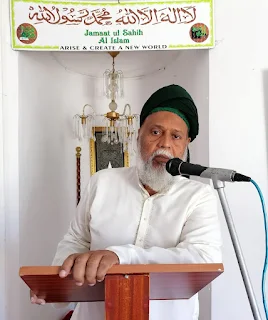The Impact of the Holy Prophet’s Good Character on Society
The Impact of the Holy Prophet’s Good Character on Society
For those who have missed obligatory fasts from previous years, it is preferable to make up for those missed days first before observing the six Nafil fasts. However, if someone has only missed fasts during the recent Ramadan, they can start with the six Nafil fasts and later make up the missed obligatory fasts. Alternatively, one can choose to make up missed fasts during Shawwal itself, but these fasts will not be considered Nafil; rather, they will be the obligatory fasts owed to Allah. After completing these obligatory fasts, if they wish, they can observe the six Nafil fasts of Shawwal.
The profound message of the Eid-ul-Fitr
In the Quran, the word “Eid” is directly
mentioned in Surah Al-Maida – Chapter 5, Verse 115. In the context of this
verse, we see how the disciples of Hazrat Isa (as) asked Allah to send down a
table laden with food from the heavens as a feast (Eid) for them, marking
it as a day of celebration and a sign of His grace.
Here, we observe how Allah not only blessed
Hazrat Isa (as) and his disciples with material provisions but also granted
them spiritual sustenance, which was continued and perfected in Islam with the
arrival of our beloved Prophet, Hazrat Muhammad (pbuh).
Thus, beyond festivities, feasts, and gatherings with family and the community, this day carries a profound message: that each Muslim should continue to lead a pious life in accordance with the teachings of Islam. It highlights a way of life rooted in spiritual, ethical, and moral values, which each believer should strive to follow throughout the year, not just during Ramadan.

Alhamdulillah, Summa Alhamdulillah, we enter the final third of this blessed month of Ramadan. During these last 10 days, Allah and His beloved Prophet Hazrat Muhammad (pbuh) have taught us that there lies a night within, so magnificent that its blessings surpass those of 1,000 months.
A Celebration of Spiritual Revival in this
Era
Today, I return to an important subject, which
is Zakaat, the third pillar of Islam. I have noticed that despite
the explanations provided about Zakaat, this subject remains unclear to many of
you. Hence, I come once again on this subject and request all my disciples to
refer to my past sermons, as well as what I am going to say to you today.
Compile this into a small booklet and distribute it to everyone so that you
have a reference regarding Zakaat and can clearly understand how you need to
calculate Zakaat and upon what assets you need to apply it.
First of all: What is Zakaat? It is a tax that Allah has made obligatory for all adult Muslims (who have reached puberty) and who possess the minimum sum upon which Zakaat is mandatory, referred to as “Nisaab.” This tax purifies the wealth of believers, not only bringing more Barakat (blessings) to their worldly and spiritual possessions but also serving as an essential means for Islam to gather sufficient funds and resources to help its progression globally. Additionally, it strengthens and enriches the poor, alleviates their suffering from poverty, and offers them a new chance to rebuild their lives – to give them a fresh start in life. Therefore, it is called the Purification Tax (a purifying tax) because sharing it with the less fortunate encourages kindness, generosity, and a balance of wealth within society, redistributing wealth to prevent the rich from becoming too rich and the poor from becoming too poor.
The
purification of the heart is very important. A believer cannot perfect their
(i.e. his or her) faith in Islam without purifying their heart and soul. With
the month of Ramadan, which serves as a training for the upcoming 11 months,
Allah has provided several means in a believer’s life to not only purify their
wealth but also their heart. One of these means is Zakat.
The Creator (Allah) and His beloved Messenger (pbuh) have
always linked the purification of the body with that of the heart. Zakat
purifies the heart and has several meanings. According to the root of its
letters (Ze, Kaaf, Waw), Zakat means ‘to purify,’ ‘the purification of the
heart,’ or even ‘the complete purification of the heart,’ which includes the
purification of our soul and inner self. The purification of the heart involves
the purification of all the members of our body.
Allah has established Zakat to purify our hearts and our possessions. Through Zakat, Allah illuminates our hearts as well as all the other members of our body. When we give Zakat in the way of our Creator, our possessions and our souls are purified. Why? Because of the joy it brings, and our beloved Prophet Muhammad (pbuh) used to do it wholeheartedly, helping the needy, which brought him much contentment as he spread wealth to the poor to eradicate poverty and give the needy the chance to live with dignity. This joy of the Prophet (pbuh) was translated into a radiant smile, his heart flooded with contentment for helping others, especially Muslims - those who believed in the one true God and in him (pbuh) as the Prophet of Allah.